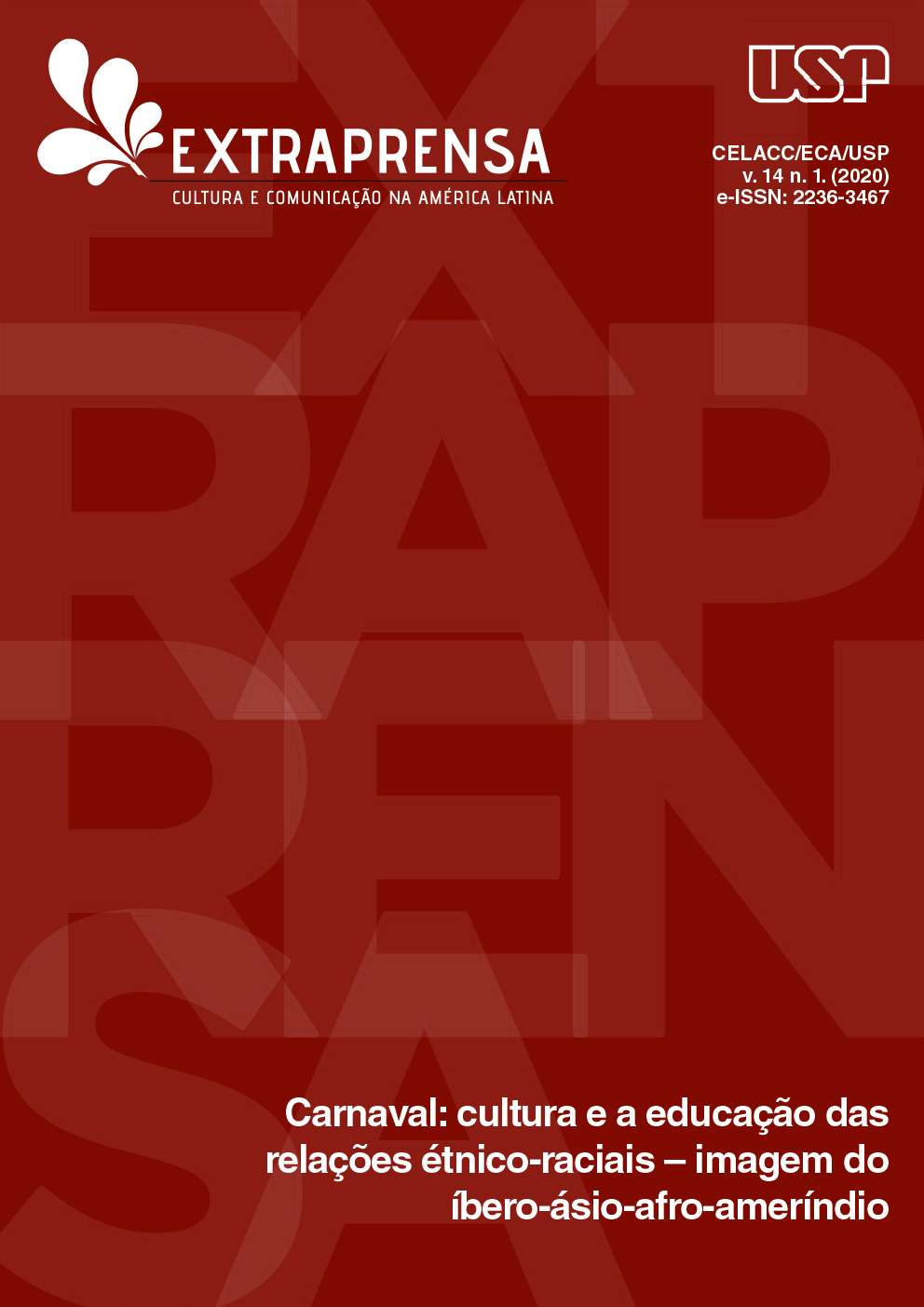Relationship between samba schools, black dances and hip hop
DOI:
https://doi.org/10.11606/extraprensa2020.176215Keywords:
Identity, Racism, Discrimination, CultureAbstract
This article begins by analyzing the program “O Negro da Senzala ao Soul”, shown by TV Cultura in 1977, in which São Paulo samba schools and the Black dance parties are compared. The program argued that samba alienates, whereas dance parties provide conditions for the increase of black social awareness. Then, we analyze the black dance parties Chic Show and Zimbabwe, showing that there is not such a great distance between the samba schools and the dance parties, as it is defended in the TV Cultura’s program. We conclude with an analysis of the relationship between hip hop movement and the samba schools and samba dancers, demonstrating that, although hip hop has serious criticism of the samba schools, they respect some samba dancers.
Downloads
References
ALBERTI, Verena; PEREIRA, Amilcar Araújo. História do movimento negro no Brasil: depoimentos ao CPDOC. Rio de Janeiro: Pallas: CPDOC-FGV, 2007.
BARONETTI, Bruno Sanches. Transformações na avenida: história das escolas de samba na cidade de São Paulo (1968-1996). São Paulo: LiberArs, 2015.
CUNHA, Manuela Carneiro da. Negros estrangeiros: os escravos libertos e sua volta à África. São Paulo: Brasiliense, 1985.
FELIX, João Batista de Jesus. Chic Show e Zimbabwe: a construção da identidade nos bailes black paulistanos. 2000. Dissertação (Mestrado em Antropologia Social) – Universidade de São Paulo, São Paulo, 2000.
MACEDO, Márcio José. Baladas Black e Rodas de Samba da Terra da Garoa In: MAGNANI, José Guilherme Cantor; SOUZA, Bruna Mantese de (org.). Jovens na metrópole: etnografias de circuitos de lazer, encontro e sociabilidade São Paulo, Editora Terceiro Nome, 2007. p. 189-224.
MOVIMENTO NEGRO UNIFICADO. 1978-1988 10 anos de luta contra o racismo. São Paulo: Confraria do Livro, 1988.
O NEGRO da Senzala ao Soul. Produção do Departamento de Jornalismo da TV Cultura. São Paulo, 1977. 1 vídeo (45 min). Publicado pelo canal Gabriel Priolli. Disponível em: https://bit.ly/36zBCyl. Acesso em: 20 dez. 2020.
SILVA, Carlos Benedito Rodrigues da. “Black-Soul”: aglutinação espontânea ou identidade étnica – uma contribuição ao estudo das manifestações culturais no meio negro. Anuário Ciências Sociais Hoje, São Paulo, v. 2, p. 244-262, 1983.
VIANNA, Hermano. O mundo funk carioca. Rio de Janeiro: Jorge Zahar, 1998.
VOZ Ativa. Intérprete: Racionais MC’s. Composição: Edy Rock e Mano Brown. In: ESCOLHA o seu caminho. São Paulo: Zimbabwe, 1992. 1 disco vinil, lado A, faixa 1.
Downloads
Published
Issue
Section
License
Copyright (c) 2020 João Batista de Jesus Félix

This work is licensed under a Creative Commons Attribution-NonCommercial-NoDerivatives 4.0 International License.
Ao submeter qualquer material científico para Extraprensa, o autor, doravante criador, aceita licenciar seu trabalho dentro das atribuições do Creative Commons, na qual seu trabalho pode ser acessado e citado por outro autor em um eventual trabalho, porém obriga a manutenção de todos os autores que compõem a obra integral, inclusive aqueles que serviram de base para o primeiro.
Toda obra aqui publicada encontra-se titulada sob as seguintes categorias da Licença Creative Commons (by/nc/nd):
- Atribuição (de todos os autores que compõem a obra);
- Uso não comercial em quaisquer hipóteses;
- Proibição de obras derivadas (o trabalho não poderá ser reescrito por terceiros. Apenas textos originais são considerados);
- Distribuição, exibição e cópia ilimitada por qualquer meio, desde que nenhum custo financeiro seja repassado.
Em nenhuma ocasião a licença de Extraprensa poderá ser revertida para outro padrão, exceto uma nova atualização do sistema Creative Commons (a partir da versão 3.0). Em caso de não concordar com esta política de Direito Autoral, o autor não poderá publicar neste espaço o seu trabalho, sob pena de o mesmo ser removido do conteúdo de Extraprensa.







